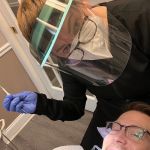How Long Does It Take for a Tooth Extraction to Heal?
Getting a tooth extraction can be a daunting experience, but it's a common procedure necessary for a variety of dental reasons. Whether it’s due to a decayed or impacted tooth, or as part of orthodontic treatment, understanding the healing process after a tooth extraction is vital for ensuring proper recovery and avoiding complications. One of the most frequent questions patients ask is: “How long does it take for a tooth extraction to heal?” In this article, we’ll explore the factors that affect healing time, what to expect during recovery, and tips for promoting healing after your tooth extraction.
1. What Happens During a Tooth Extraction?
A tooth extraction involves the removal of a tooth from its socket in the bone. The procedure can be simple or surgical, depending on the condition of the tooth. In a simple extraction, the tooth is visible and can be removed with minimal effort. However, in more complex extractions, such as the removal of impacted teeth, the procedure might involve cutting through gum tissue and bone to remove the tooth. Regardless of the complexity, both procedures initiate a healing process that involves your body creating a clot at the site, followed by tissue regeneration.
The initial stages of recovery are crucial as the body works to seal the wound and reduce any immediate inflammation. After the procedure, your dentist or oral surgeon will provide aftercare instructions, including information on pain management, eating restrictions, and when to follow up. Understanding these early stages can help you manage your recovery more effectively.
2. Typical Healing Time for Tooth Extractions
In general, the majority of the healing process after a tooth extraction occurs within the first two weeks. However, the total time required for full healing can vary based on several factors, including the complexity of the extraction, the patient's overall health, and adherence to aftercare instructions.
- First 24 to 48 Hours: The first 24 hours are critical in the healing process. You’ll experience some bleeding and swelling, which is perfectly normal. It's important to rest and avoid disturbing the extraction site by sucking, spitting, or drinking through a straw.
- First Week: By the end of the first week, most of the swelling should have subsided, and the pain should begin to lessen. The gum tissue at the site will start to close, and you might begin to feel better with a reduced need for pain medication.
- Two Weeks: After two weeks, the soft tissue will largely have healed, although the bone underneath will still be going through a more gradual healing process. The stitches may dissolve, or your dentist may remove them depending on the type used.
- Full Recovery: Full recovery, including complete bone healing, typically takes several months. This is especially true for complex extractions such as wisdom teeth or impacted tooth removals. In some cases, it can take up to 6 months for the bone to fully regenerate and reshape.
3. Factors Affecting the Healing Time
While a typical recovery takes about 1-2 weeks for the soft tissue to heal, several factors can affect the healing process:
- Age: Younger patients tend to heal more quickly than older adults. The body’s natural healing processes tend to slow down with age.
- Oral Hygiene: Proper oral hygiene is essential for a quick and complication-free recovery. Keeping the area clean can prevent infection and promote faster healing.
- Health Conditions: Underlying health issues such as diabetes, smoking, or poor nutrition can impede the healing process. Always inform your dentist about any pre-existing conditions.
- Complexity of Extraction: More complicated extractions, such as the removal of impacted wisdom teeth, require a longer healing time. These extractions may involve more extensive tissue removal or surgical intervention.
4. Tips for Promoting Faster Healing
To ensure the best recovery and minimize the risk of complications, here are some tips for speeding up the healing process after a tooth extraction:
- Rest: Resting after the extraction is crucial. Avoid strenuous activity, as it can increase bleeding and prolong healing time.
- Ice Packs: Applying ice to the affected area for the first 24 hours can reduce swelling and numb the area, which helps alleviate discomfort.
- Follow Aftercare Instructions: Your dentist will give you specific aftercare instructions, including recommendations on what to eat, how to clean your mouth, and when to return for a follow-up appointment. Follow these closely to avoid complications.
- Avoid Smoking and Alcohol: Smoking and alcohol consumption can hinder healing by irritating the wound or reducing blood flow to the area.
- Eat Soft Foods: For the first few days after the extraction, eat soft foods that don't require much chewing, such as soups, mashed potatoes, or smoothies. Avoid anything hot or spicy.
- Manage Pain: Your dentist will likely recommend pain medication or over-the-counter options like ibuprofen to manage pain. Take medications as directed to stay comfortable while healing.
5. When to Contact Your Dentist
While some pain and swelling are normal, there are certain signs that could indicate a complication. It’s important to contact your dentist if you experience:
- Severe or worsening pain that doesn't improve with medication.
- Excessive swelling or bleeding that doesn't subside.
- Fever or chills, which could indicate infection.
- Discomfort in the jaw or difficulty opening your mouth.
By staying vigilant and contacting your dentist if needed, you can ensure a smoother recovery process and avoid unnecessary complications.
6. What to Expect After Full Recovery
After the extraction site has fully healed, you may notice some changes in the area where the tooth was removed. The bone will gradually reshape itself, and the surrounding gum tissue will become firm and healthy. In some cases, patients choose to replace the missing tooth with a dental implant, bridge, or partial denture, depending on the location of the tooth and personal preferences.
While the healing process can take several months, it’s important to remember that everyone heals differently. With proper care, most people experience a smooth recovery, but some may take longer than others. If you’re concerned about your healing or recovery time, don’t hesitate to reach out to your dentist for guidance.
SEO Title: How Long Does It Take for a Tooth Extraction to Heal?
SEO Keywords: tooth extraction healing time, recovery after tooth extraction, healing process for tooth extraction, dental healing timeline, post tooth extraction care
SEO Description: Learn about the healing time after a tooth extraction. Understand the stages of recovery, factors that influence healing, and tips for promoting a quick recovery after your procedure.







 Children's Dentistry of the Palisades4.0 (137 review)
Children's Dentistry of the Palisades4.0 (137 review) Uchida Clyde Y DDS3.0 (9 review)
Uchida Clyde Y DDS3.0 (9 review) Champlin Family Dental4.0 (613 review)
Champlin Family Dental4.0 (613 review) Yonkers Dental Implants Center4.0 (63 review)
Yonkers Dental Implants Center4.0 (63 review) Dental Specialty Associates4.0 (1196 review)
Dental Specialty Associates4.0 (1196 review) Samson Wahl & Associates5.0 (6 review)
Samson Wahl & Associates5.0 (6 review) The Importance of Oral Health Education During Pregnancy for a Healthy Pregnancy
The Importance of Oral Health Education During Pregnancy for a Healthy Pregnancy Best Tips for Brushing Your Teeth Properly for Healthy Gums: Essential Techniques for Oral Health
Best Tips for Brushing Your Teeth Properly for Healthy Gums: Essential Techniques for Oral Health Why Skipping Dental Checkups Can Lead to Bigger Oral Health Problems
Why Skipping Dental Checkups Can Lead to Bigger Oral Health Problems Advantages of Porcelain Dental Restorations
Advantages of Porcelain Dental Restorations How Can Diabetes Cause Tooth and Gum Problems? Preventing and Managing Oral Health Issues
How Can Diabetes Cause Tooth and Gum Problems? Preventing and Managing Oral Health Issues Healthy Habits for Promoting Good Oral Health and Hygiene: Tips for a Healthy Smile
Healthy Habits for Promoting Good Oral Health and Hygiene: Tips for a Healthy Smile